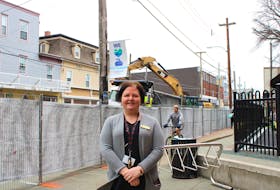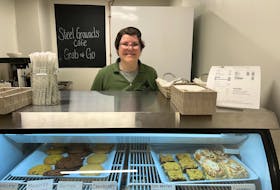ST. JOHN'S, N.L. — A new poll suggests Atlantic Canadians are especially fearful a second wave of the coronavirus will hurt the economy even more than the first wave did, and an economist at Memorial University says there are definitely factors validating those fears.
The Angus Reid poll gathered opinions on the second wave, coming at a time when a number of provinces have experienced an increase in new COVID-19 cases. In Canada, 51 per cent of respondents felt the economic damage would be worse than it was through the first wave. This response was most common in Alberta (58 per cent) and Atlantic Canada (56 per cent).
MUN economist Tony Fang said it makes sense these two regions were the most pessimistic, pointing out Newfoundland and Labrador and Alberta are intertwined economically.
"I think one of the most important reasons for that is actually they're driven by a resource economy," said Fang, the Stephen Jarislowsky Chair in Economic and Cultural Transformation at Memorial. "This is probably a so-called double whammy or triple whammy effect."
Activity in the oil and gas sector has already slowed, and a second wave of the coronavirus would not help the industry, Fang said.
"I think the big question would be, if and when a second wave comes, will there be another shutdown?" The key piece of it is we want to avoid another overall shutdown like we saw the first time, because I think that certainly, economically, would be dangerous." — Paul MacKinnon
As for further factors validating the fear a second wave would hit the economy harder, Fang said there could be a fatigue effect as the months drag on, leading to a less vigilant public when it comes to adhering to physical distancing rules. Additionally, a second wave will be hard on governments expected to support those affected, whether it's laid-off workers or businesses needing help.
"There's a concern whether we can put in more of those kinds of resources," Fang said.
Earlier this month, the federal government announced it is projecting a $343-billion deficit for the current fiscal year, and last week the Newfoundland and Labrador government announced a $2.1-billion projected deficit.
Downtown economy
Downtown Halifax Business Commission CEO Paul MacKinnon acknowledged that even though Nova Scotia is in a good place at the moment with no active cases, most people expect that a second wave will come. He considers the recent decision to make masks mandatory for indoor public spaces a step toward changing behaviours in anticipation of whatever comes next.
How much a second wave hurts the local business community will depend how widely the coronavirus spreads.
"I think the big question would be, if and when a second wave comes, will there be another shutdown?" MacKinnon said. "The key piece of it is we want to avoid another overall shutdown like we saw the first time, because I think that certainly, economically, would be dangerous."
A second wave would inevitably slow the economy, but the avoidance of a complete shutdown would at least minimize the effect somewhat, he said.

AnnMarie Boudreau, CEO of the St. John's Board of Trade, is optimistic businesses are better equipped to deal with a second wave compared to the situation in March.
“We know that measures such as distance, plastic barriers, masks, gloves and sanitizer can help to create a safe environment, and for those reasons, I am hopeful that we will be able to be more resilient and tempered in our approach if we are faced with a second wave,” Boudreau said.
When COVID-19 first hit the region in March, it almost felt to MacKinnon like the pandemic came out of nowhere. Some businesses managed to adapt through online offerings and delivery systems for selling goods.
"If there's a second wave, businesses will be more prepared this time," MacKinnon said. "Having said that, a lot of them will be coming into it from a much weaker position than before, because we've had months and months now with a severe decrease in sales for pretty much everybody."
Potential closures
MacKinnon said some business owners decide to close shop after Christmas, with the knowledge that January through May tends to be a slow stretch.
"I suspect that we'll see a much larger number of businesses make a decision to close at that time," MacKinnon said. "We don't really have a sense of what that number looks like — hopefully, it's not too large. But I expect we will see almost a second wave of business closures, almost regardless of what happens."
Boudreau said her organization has heard from many members who indicate they would not be able to survive another lockdown. But she also knows there are many who have made the right decisions and made adjustments to deal with the new reality.
“There are many examples of businesses in multiple sectors who very quickly figured out how to continue serving their customers,” Boudreau said. “So, while I hope there isn’t a need, I think those who did adjust and innovate, as a means to survive the first wave, are better positioned perhaps to handle a second.”
Fang says technology and research and development companies will have an easier time making it through a second wave, as will businesses taking advantage of e-commerce.
As for workers temporarily laid off during a second wave, Fang expects many will eventually lose their job permanently.
Among them would be many already finding themselves in a bad place financially. The Angus Reid data shows Canadians whose finances are in bad or terrible shape were the most likely to believe the economic impact of a second wave would be worse than before (59 per cent) and the most likely to believe it would negatively affect their financial standing (85 per cent).
Twitter: @CBNAndrew









